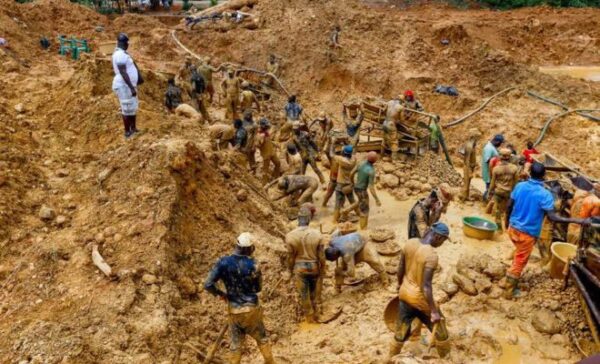Ban on use of mercury: Artisanal miners oblivious of new law, others remain defiant

A DOZEN men brave the scorching heat from a hot summer afternoon as they carry sacks of ore on their backs from a disused mine in Esigodini to an open area where a heap of bags is fast piling up.
The men — artisanal miners — are moving the ore from a mine shaft they say is between 100 to 120 metres deep, to an open field from where it will be transported to a stamp mill.
The disused mine belonged to a German mining firm that stopped operations years ago after it became unsustainable as a result of high operational costs but the mine still has gold deposits hence the artisanal miners are working there.
More than 40 omakorokoza (artisanal miners) work long hours, day and night at the disused mine searching for the precious yellow metal.
It’s a laborious job that pays handsomely for the lucky ones who strike gold but the search for the precious mineral comes with health complications for artisanal miners.
The continuous pounding of the stamp mill as it crushes the ore to separate the gold, feels the air as each group of artisanal miners readies to get to the final stages of the long process of gold extraction.
One artisanal miner Sibusiso Mlambo shows the Chronicle news crew the damage to his hands caused by handling mercury in the final stage of refining the gold.
His fingertips on both hands have retained a yellowish colour that almost obscures his fingerprints and Mlambo says this was brought about when he started handling mercury to purify gold.
In artisanal mining, mercury is mixed with gold-containing materials, forming a mercury-gold mixture, which is then heated to obtain the gold. As the mercury-gold mixture is heated, the air fills with fumes as the liquid metal evaporates — leaving behind a lump of gold.
It’s a dangerous process which can lead to significant mercury exposure and health risks.
Mlambo knows the risks of handling mercury but says he has no choice.
“We all know the risks of using mercury but it’s the only chemical readily available to us to purify our gold. We are just a group of miners who come together in the disused mine to earn a living and we can’t afford these new methods of purifying gold without using mercury,” said Mlambo.
Asked if he is aware that the use of mercury has been banned in the country as of December 2020, Mlambo shakes his head and shrugs.
“I don’t read newspapers or listen to the radio. Where will I get the time to do that? I’m always in the shafts or at the stamp mill working,” he said.
His colleague Absolom Nleya chips in.
“The Government or whoever banned the use of mercury must give us alternatives to use to purify our gold and it must be cheap and readily available otherwise we will continue using mercury as long as we can buy it here in Esigodini.
“It’s only those big companies or established miners who can afford to use cyanide to extract gold, we don’t have the money or the capacity to do that so using mercury is the quickest way to get our gold,” said Nleya.
A teaspoon of mercury costs R150 in Esigodini and the artisanal miners need about four teaspoons to purify gold from a truckload of ore.
However, the two artisanal miners are not completely oblivious of the health risks associated with mercury as they described health problems such as weight loss, body weakness and trembling hands, which they say they started experiencing after exposure to mercury over the last five years.
Mercury has been used to extract gold for centuries. It is inexpensive and simple — often allowing miners to produce gold in a single day.
Developed nations have adopted cleaner, safer alternatives for extracting gold and enforced strict rules on mercury use.
In 2016 IPEN, a Stockholm-based network of charities focusing on health and environment, collected hair samples from over a thousand artisanal miners from 25 countries including Kenya, Myanmar and Indonesia, that were tested for mercury.
IPEN found that more than 40 percent of those tested had mercury levels greater than 1 part per million — exceeding the United States Environmental Protection Agency’s safe exposure level.
High mercury levels can damage the nervous, digestive and immune systems and poison the lungs, kidneys, skin and eyes, according to the World Health Organization (WHO). Pregnant women also risk giving birth to babies with congenital diseases.
Back in Zimbabwe the ban on the use of mercury presents artisanal miners with a challenge to find other means of purifying gold but the thousands of those miners scattered across the country are either unaware of the risks of using mercury or just don’t care.
What are the alternatives?
Although many miners use mercury in artisanal and small-scale gold mining, it is possible to safely and economically recover gold without it, says Tawanda Musekiwa, an environmental expert formerly employed by the Environmental Management Agency (Ema):
“There are a number of mercury-free techniques that are safer for miners, their families and local communities and the environment, which if used properly can also help miners market their gold at higher prices.
“And using these various mercury-free techniques artisanal and small-scale miners can achieve high rates of gold recovery while also protecting themselves. They vary from panning, sluicing, use of spiral concentrators, vortex concentrators to chemical leaching,” said Musekiwa.
The most common alternative to using mercury is a process known as chemical leaching, which makes use of the chemical properties of gold to leach it from crushed ore.
“This process is mostly used in large-scale mining operations but has been increasingly adopted in small-scale mining because of its high gold recovery rate.
“The best practices for chemical leaching are a combination of pre-concentration and mill leaching as they lead to the least amount of waste, a short processing time for miners and high gold recoveries,” said Musekiwa.
He however, warned that when chemical leaching is employed, it is important for miners to handle the chemicals properly and ensure that they are properly used and stored to avoid health and environmental concerns.
“Cyanide is often the preferred chemical used in leaching. Cyanide is highly toxic and great care must be taken when using it. However, in contrast to mercury, cyanide does not persist in the environment,” he said.
In December last year, Zimbabwe ratified the Minamata Convention banning the use of mercury in mining and regulatory measures for its release from industrial equipment like boilers, incinerators and power stations among others.
The convention was ratified following a motion moved by Environment, Climate Change, Tourism and Hospitality Industry Mangaliso Ndlovu in the National Assembly before its adjournment for 2020.
The Minamata Convention on mercury was adopted at the Fifth Session of the Inter-Governmental Committee in Geneva, Switzerland on 19 January, 2013 and is a global treaty whose objective is to protect human health and environment from the adverse effects of mercury.
Zimbabwe becomes the 116th country to ratify the Treaty and the 51st in Africa.
In resolving to make the bold decision to ban the use of mercury in Zimbabwe, Minister Ndlovu stated the following reasons:
“Mercury is a toxic pollutant that can circulate globally through the oceans and the atmosphere for years or even decades, and can cause significant harm to human health and the environment, sometimes very far from its point of origin. Acute or chronic exposure can be fatal; the World Health Organisation lists it as one of the top ten chemicals of major public health concern,” he said.
Zimbabwe’s most significant mercury sources are from artisanal or small-scale gold mining production, dental amalgam and waste water treatment. The country’s mercury use is already strictly controlled under a number of legislations.
Small-scale miner, Nqobani Siziba, who runs a mining operation in the Inyathi area, in Bubi District that employs an average of 30 workers reckons that it will be a hard to convince artisanal miners to completely stop using mercury.
“Each mining operation is unique and presents its own set of challenges. Artisanal miners have relied on mercury for years despite its dangers to their health and the environment.
“They go into the shafts, say for three days, get their ore crushed at a stamp mill on the fourth day and use mercury to extract the gold, sell it and share the proceeds, all in under five days. So, asking these guys to find alternative ways of extracting gold from crushed ore without using mercury is going to be very difficult,” he said.
Siziba has built concrete tanks at his mine that he uses to extract gold using the process of chemical leaching.
“Chemical leaching requires the availability of water and electricity and is preferred by established miners who are not looking at quick-fix solutions to extract gold but I must say it’s an expensive process that requires long hours of manpower on a daily basis,” he said.
According to the Reserve Bank of Zimbabwe’s gold buying arm, Fidelity Printers, small scale gold miners contribute about 60 percent of the gold produced in the country annually.
Zimbabwe Mining Federation (ZMF) chief executive officer Wellington Takavarasha implored miners to adhere to the new regulations on the use of mercury.
“It’s important for miners to note that the ban on the use of mercury is a crucial move and long-awaited effort to reduce its exposure to miners and communities after so many years of rampant use and disposal into the environment. There are other alternatives that miners can use to extract gold without the use of mercury,” said Takavarasha.
Observers however, say Zimbabwe is not ready to implement the ban on mercury use because the small-scale mining sector is not yet formalised and structured for proper regulation and control.
The Minamata Convention seeks to attain effective and sustainable ways of eliminating the use of mercury by 2022.
The economy of Zimbabwe is being sustained by gold mining with artisanal and small-scale miners contributing more than the large-scale miners.
Banning mercury use without an adequate action plan will therefore have a significant effect on the economy.
What is needed is to come up with action plans that are consistent with the Minamata Convention and then train as well as provide financial assistance to the miners during the transition to mercury-free gold mining.
The Chronicle


